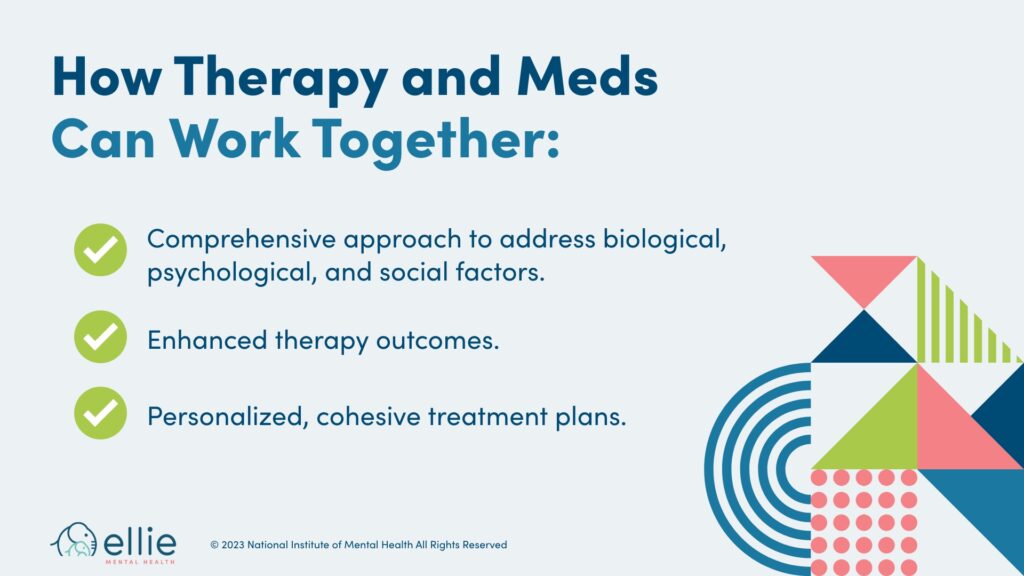Finding effective treatment for mental health conditions is a journey that often involves a combination of therapy and medication. These two treatment modalities, when used together, can offer powerful benefits and synergistic effects. When considering mental health medications, When considering mental health medications, we advise you to speak with a psychiatrist to learn about your options. In this blog post, we will delve into the distinct advantages of therapy and medication, how they address different aspects of mental health, and explore how they can work together harmoniously to provide comprehensive care.
If you or a loved one is considering medication for your mental health, we’d love to speak with you. Ellie Mental Health has immediate openings for psychiatry and medication management. Fill out our quick and easy form using the link below and someone from our highly-qualified team will reach out to you.
The Power of Therapy
Therapy, also known as counseling or psychotherapy, is a collaborative process between an individual and a trained mental health professional. It provides a safe and supportive environment to explore thoughts, emotions, behaviors, and develop coping strategies. Here are some key benefits of therapy:
Insight and Self-Awareness
Therapy helps individuals gain a deeper understanding of themselves, their patterns of thinking, and their emotional responses. Through self-reflection and the guidance of a therapist, individuals can identify underlying issues, explore past experiences, and gain valuable insights into their mental health challenges.
Skill Development
Therapy equips individuals with the necessary tools and coping skills to manage their mental health challenges effectively. It fosters the development of healthy coping mechanisms, communication skills, problem-solving abilities, and resilience.
Behavior Modification
Therapy can help individuals identify and modify unhelpful or negative behaviors that contribute to their mental health difficulties. By addressing maladaptive patterns, therapy empowers individuals to make positive changes and adopt healthier behaviors.
Relationship Enhancement
Many mental health challenges can impact personal relationships. Therapy offers a space to work through relationship issues, improve communication skills, and develop healthier dynamics in both personal and professional contexts.
The Role of Medication
Mental health medication, prescribed and managed by a psychiatrist or other qualified healthcare professional, focuses on targeting neurochemical imbalances in the brain associated with mental health conditions. Here are some ways in which medication can be beneficial:
Symptom Management
Psychiatric medications can effectively alleviate and manage symptoms associated with various mental health conditions. For instance, antidepressants can reduce symptoms of depression, anti-anxiety medications can help manage anxiety disorders, antipsychotics can be used to address symptoms of schizophrenia, and mood stabilizers address the symptoms of bipolar disorder.
Optimizing Brain Function
Mental health conditions often involve disruptions in the normal functioning of neurotransmitters and other biochemical factors in the brain. Medication can help restore a healthy balance and optimize brain functioning, resulting in a reduction of symptoms and an overall improvement in well-being.
Stabilizing Mood and Functioning
Medication can stabilize mood, reducing the severity and frequency of mood swings, emotional fluctuations, or intrusive symptoms that disrupt daily functioning. This stability allows individuals to engage more effectively in therapy and implement the skills they learn.
Check out our other blog with insights for a deeper understanding of ADHD medications.

How Therapy and Medication Can Work Together
While therapy and medication offer distinct benefits, their combination can lead to enhanced treatment outcomes. Here’s how therapy and medication can work together synergistically:
Comprehensive Approach
Mental health conditions are complex and involve biological, psychological, and social factors. Therapy provides a space for individuals to address the psychological and behavioral aspects of their challenges, gain insights, and develop coping strategies. Meanwhile, medication complements therapy by targeting the biological aspects, alleviating symptoms, stabilizing brain chemistry, and addressing neurochemical imbalances. By combining therapy and medication, individuals benefit from a comprehensive treatment plan that considers all dimensions of mental health, addressing both the psychological and biological factors contributing to their condition. This integrated approach offers the best chance for long-term recovery, improved functioning, and overall well-being. Therapy empowers individuals to make positive changes, while medication provides relief from symptoms and optimizes brain chemistry, resulting in a holistic and comprehensive treatment approach.
Enhanced Therapy Outcomes
Medication can create a foundation of stability, enabling individuals to engage more effectively in therapy. By reducing severe symptoms, medication can create a conducive environment for therapy to be more productive. It allows individuals to implement the skills learned in therapy and gain a deeper understanding of themselves.
Personalized Treatment
The combination of therapy and medication allows for personalized treatment plans that consider the unique needs and circumstances of each individual. Healthcare providers collaborate, sharing information and insights, to develop a cohesive treatment approach that maximizes the benefits of both therapy and medication.
Check out our other blog for more information on mental health medication management.
Can Medication Alone Heal Mental Illness?
A common question that arises is whether medication alone can heal mental illness. While medication plays a crucial role in managing symptoms and improving overall well-being, it is generally not considered a standalone solution for healing mental illness completely. Here’s why:
Biological Factors
Mental illnesses often involve complex interactions between genetic, biological, psychological, and environmental factors. While medication can address the biological aspect by targeting neurochemical imbalances, it does not directly address other contributing factors. Healing mental illness requires a comprehensive approach that encompasses psychological, social, and environmental considerations.
Medications can also benefit those with PMS or PMDD. Check out our other blog to learn more about the difference between PMS and PMDD and how medications can help.
Understanding Underlying Causes
Mental health conditions are often rooted in underlying issues such as past trauma, unresolved conflicts, or maladaptive thought patterns. Therapy provides a safe and supportive environment to explore these underlying causes, gain insights, and develop strategies to address them effectively. Medication alone may provide symptom relief but does not address the underlying causes of the illness.
Developing Coping Skills
Therapy equips individuals with the necessary tools and coping skills to manage their mental health challenges effectively. Through therapy, individuals can learn strategies to regulate emotions, challenge negative thoughts, improve communication, and develop resilience. These skills are essential for long-term recovery and managing symptoms even after discontinuing medication.
Holistic Approach
Mental health treatment should be approached holistically, considering all aspects of an individual’s well-being. This includes addressing social support systems, lifestyle factors, self-care practices, and identifying and modifying negative behavioral patterns. Therapy plays a vital role in this holistic approach, helping individuals navigate these various dimensions of their mental health and create positive changes.
While medication can significantly improve symptoms and provide stability, it is often most effective when used in conjunction with therapy. The combination of medication and therapy allows for a comprehensive treatment approach that addresses the biological, psychological, and social factors contributing to mental illness.
It’s important to note that the decision to include medication as part of the treatment plan should be made in collaboration with a qualified healthcare professional. They can assess the individual’s specific needs, monitor medication effectiveness, manage potential side effects, and make adjustments as necessary.
Therapy and medication are powerful tools in the treatment of mental health conditions. While therapy focuses on insight, skill development, and behavior modification, medication targets neurochemical imbalances and symptom management. When used together, therapy and medication can provide a comprehensive and holistic approach to mental health treatment, addressing different aspects of the condition and enhancing overall outcomes. Remember, the decision to incorporate therapy, medication, or both should be made in collaboration with healthcare professionals who can assess individual needs and develop a personalized treatment plan that optimizes the benefits of both modalities. With the right support and a tailored treatment plan, individuals can embark on a path towards healing, growth, and improved well-being.
If you or a loved one is considering medication for your mental health, we’d love to speak with you. Ellie Mental Health has immediate openings for psychiatry and medication management. Fill out our quick and easy form using the link below and someone from our highly-qualified team will reach out to you.


